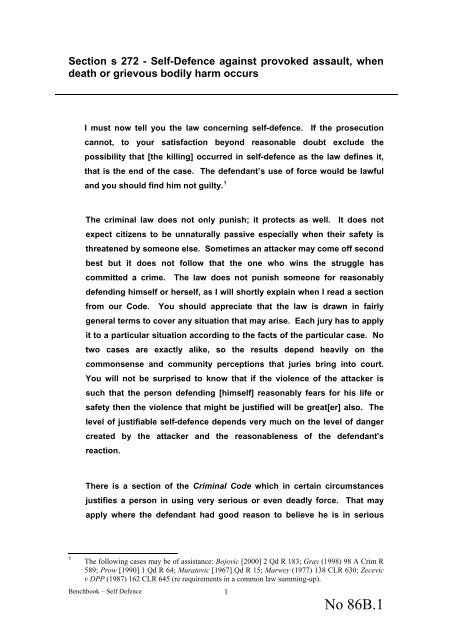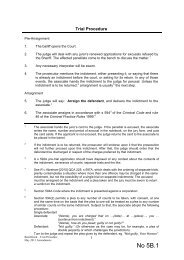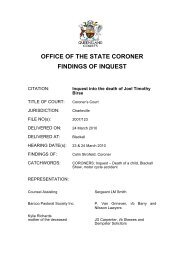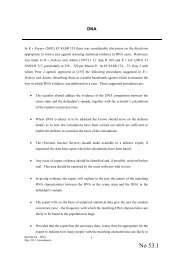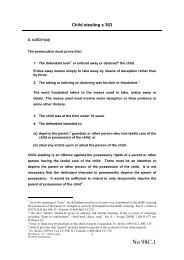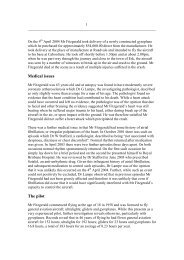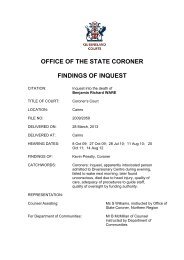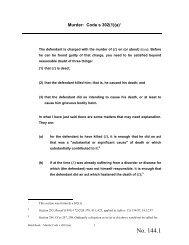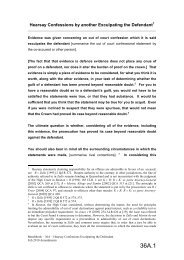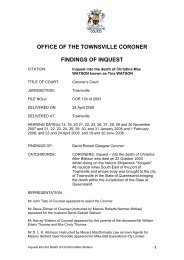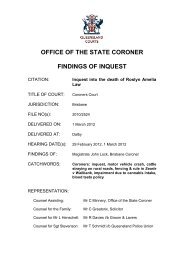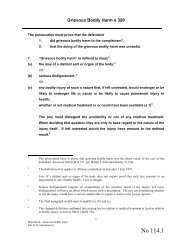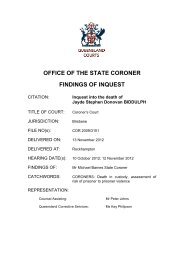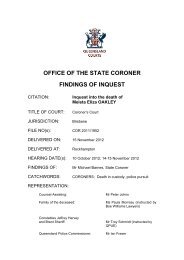Section s 272 - Self-Defence against provoked assault, when death ...
Section s 272 - Self-Defence against provoked assault, when death ...
Section s 272 - Self-Defence against provoked assault, when death ...
Create successful ePaper yourself
Turn your PDF publications into a flip-book with our unique Google optimized e-Paper software.
<strong>Section</strong> s <strong>272</strong> - <strong>Self</strong>-<strong>Defence</strong> <strong>against</strong> <strong>provoked</strong> <strong>assault</strong>, <strong>when</strong><br />
<strong>death</strong> or grievous bodily harm occurs<br />
I must now tell you the law concerning self-defence. If the prosecution<br />
cannot, to your satisfaction beyond reasonable doubt exclude the<br />
possibility that [the killing] occurred in self-defence as the law defines it,<br />
that is the end of the case. The defendant’s use of force would be lawful<br />
and you should find him not guilty. 1<br />
The criminal law does not only punish; it protects as well. It does not<br />
expect citizens to be unnaturally passive especially <strong>when</strong> their safety is<br />
threatened by someone else. Sometimes an attacker may come off second<br />
best but it does not follow that the one who wins the struggle has<br />
committed a crime. The law does not punish someone for reasonably<br />
defending himself or herself, as I will shortly explain <strong>when</strong> I read a section<br />
from our Code. You should appreciate that the law is drawn in fairly<br />
general terms to cover any situation that may arise. Each jury has to apply<br />
it to a particular situation according to the facts of the particular case. No<br />
two cases are exactly alike, so the results depend heavily on the<br />
commonsense and community perceptions that juries bring into court.<br />
You will not be surprised to know that if the violence of the attacker is<br />
such that the person defending [himself] reasonably fears for his life or<br />
safety then the violence that might be justified will be great[er] also. The<br />
level of justifiable self-defence depends very much on the level of danger<br />
created by the attacker and the reasonableness of the defendant's<br />
reaction.<br />
There is a section of the Criminal Code which in certain circumstances<br />
justifies a person in using very serious or even deadly force. That may<br />
apply where the defendant had good reason to believe he is in serious<br />
1<br />
The following cases may be of assistance: Bojovic [2000] 2 Qd R 183; Gray (1998) 98 A Crim R<br />
589; Prow [1990] 1 Qd R 64; Muratovic [1967] Qd R 15; Marwey (1977) 138 CLR 630; Zecevic<br />
v DPP (1987) 162 CLR 645 (re requirements in a common law summing-up).<br />
Benchbook – <strong>Self</strong> <strong>Defence</strong><br />
1<br />
No 86B.1
danger of losing his own life or suffering very serious injury, even though<br />
he himself <strong>provoked</strong> the <strong>assault</strong>.<br />
Generally speaking this defence applies where the defendant has started a fight<br />
and been threatened by an overt reaction, or at least by such violence as to<br />
cause reasonable apprehension of <strong>death</strong> or grievous bodily harm.<br />
<strong>Section</strong> <strong>272</strong> of our Criminal Code reads:<br />
1. “When a person has unlawfully <strong>assault</strong>ed another or has<br />
<strong>provoked</strong> an <strong>assault</strong> from another, and that other <strong>assault</strong>s the<br />
person with such violence as to cause reasonable apprehension<br />
of <strong>death</strong> or grievous bodily harm, and to induce the person to<br />
believe, on reasonable grounds, that it is necessary for the<br />
person’s preservation from <strong>death</strong> or grievous bodily harm to use<br />
force of self-defence, the person is not criminally responsible for<br />
using any such force as is reasonably necessary for such<br />
preservation, although such force may cause <strong>death</strong> or grievous<br />
bodily harm.<br />
2. This protection does not extend to a case in which the person<br />
using force which causes <strong>death</strong> or grievous bodily harm first<br />
began the <strong>assault</strong> with intent to kill or to do grievous bodily harm<br />
to some person; not to a case in which the person using force<br />
which causes <strong>death</strong> or grievous bodily harm endeavoured to kill<br />
or to do grievous bodily harm to some person before the<br />
necessity of so preserving himself or herself arose; nor, in either<br />
case, unless, before such necessity arose, the person using such<br />
force declined further conflict, and quitted it or retreated from it<br />
as far as was practicable.”<br />
Matters for consideration are:<br />
Benchbook – <strong>Self</strong> <strong>Defence</strong><br />
• Whether the defendant had unlawfully <strong>assault</strong>ed the<br />
[deceased/complainant] or had <strong>provoked</strong> an <strong>assault</strong> from the<br />
[deceased/complainant];<br />
2<br />
No 86B.2
• Did the defendant have a reasonable apprehension of <strong>death</strong> or<br />
grievous bodily harm?<br />
• Did the defendant believe, on reasonable grounds, that it was<br />
necessary in order to preserve himself from <strong>death</strong> or grievous<br />
bodily harm to use force in self-defence?<br />
• Was the force used by the defendant such as was reasonably<br />
necessary to preserve him from <strong>death</strong> or grievous bodily harm?<br />
If the prosecution exclude any one of those four matters beyond<br />
reasonable doubt, then that excludes that possible defence.<br />
Additionally, that defence does not apply where:<br />
• The defendant first began the <strong>assault</strong> with intent to kill or to<br />
do grievous bodily harm to the [deceased/complainant/some<br />
person];<br />
• Nor where the defendant endeavoured to kill or to do grievous<br />
bodily harm to the [deceased/complainant/some person] before<br />
the necessity of so preserving himself arose;<br />
• Nor, in either case, unless, before such necessity of so<br />
preserving himself arose, the defendant and declined further<br />
conflict and quitted it or retreated from it as far as was<br />
practicable.<br />
So, if the prosecution satisfy you beyond reasonable doubt that:<br />
Benchbook – <strong>Self</strong> <strong>Defence</strong><br />
1. The <strong>assault</strong> by the other person was not of such<br />
violence as to cause reasonable apprehension of <strong>death</strong><br />
or grievous bodily harm; or<br />
2. That the <strong>assault</strong> did not induce the defendant to<br />
believe, on reasonable grounds, that it was necessary<br />
for his own preservation from <strong>death</strong> or grievous bodily<br />
harm to use the force used in self-defence; or<br />
3<br />
No 86B.3
3. That the force used was more than was reasonably<br />
necessary to save the defendant from <strong>death</strong> or<br />
grievous bodily harm; or<br />
4. That the defendant [or person using the force which<br />
caused the <strong>death</strong> or grievous bodily harm] first began the<br />
initial <strong>assault</strong> with intent to kill or to do grievous bodily<br />
harm to some person; or<br />
5. The defendant [or person using the force which caused<br />
<strong>death</strong> or grievous bodily harm] endeavoured to kill or do<br />
grievous bodily harm to some person before the<br />
necessity of so preserving himself arose; or that<br />
6. In either case, unless, before such a necessity for selfdefence<br />
arose, the defendant [or person using such<br />
force] declined further conflict, and quitted it, or<br />
retreated from it as far as practicable 2 ;<br />
then the defence is excluded.<br />
Remember it is for the prosecution to satisfy you beyond reasonable<br />
doubt that self-defence does not apply. There is no burden on the<br />
defendant to satisfy you that he was acting in self-defence, or to establish<br />
any one of the six things I have described to you. The prosecution is<br />
obliged to exclude any one of those, if it can, beyond reasonable doubt.<br />
2 On the question of retreat contrast Muratovic [1967] Qd R 15 with Johnson [1964] Qd R 1,<br />
14.<br />
Benchbook – <strong>Self</strong> <strong>Defence</strong><br />
4<br />
No 86B.4


